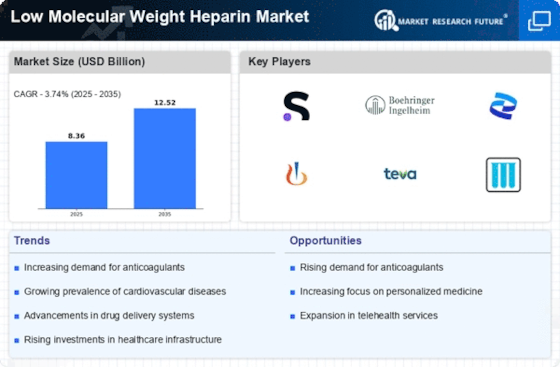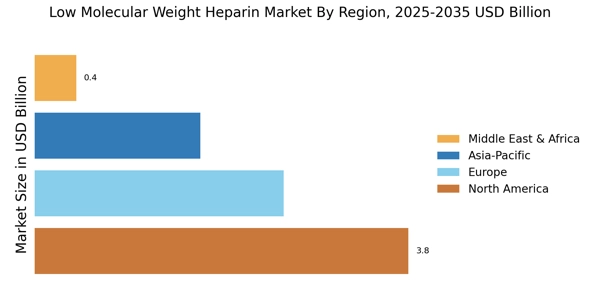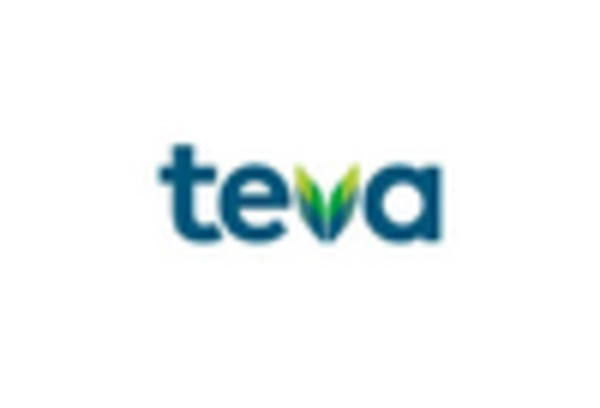Rising Geriatric Population
The aging population is another significant factor influencing the Low Molecular Weight Heparin Market. As individuals age, they are more susceptible to various health conditions, including venous thromboembolism and other clotting disorders. The World Health Organization has projected that the number of people aged 60 years and older will double by 2050, leading to an increased demand for anticoagulant therapies. Low molecular weight heparins are often preferred due to their ease of administration and favorable safety profile. This demographic shift suggests that the Low Molecular Weight Heparin Market will likely experience robust growth as healthcare providers seek effective treatment options for the elderly, who are at a higher risk for thromboembolic events.
Growing Awareness of Preventive Healthcare
The increasing awareness of preventive healthcare measures is significantly impacting the Low Molecular Weight Heparin Market. As patients and healthcare providers recognize the importance of preventing thromboembolic events, there is a heightened focus on the use of anticoagulants for prophylactic purposes. Educational campaigns and initiatives aimed at promoting awareness of thromboembolic risks are likely to drive demand for low molecular weight heparins. This trend is further supported by clinical guidelines recommending the use of these agents in high-risk populations. Consequently, the Low Molecular Weight Heparin Market is expected to benefit from this shift towards preventive healthcare, as more individuals seek to mitigate their risk of thromboembolic complications.
Regulatory Support for Anticoagulant Therapies
Regulatory support for anticoagulant therapies is a crucial driver for the Low Molecular Weight Heparin Market. Regulatory agencies are increasingly recognizing the importance of low molecular weight heparins in managing thromboembolic disorders. This recognition is leading to streamlined approval processes for new formulations and indications, thereby facilitating market entry for innovative products. Additionally, favorable reimbursement policies are encouraging healthcare providers to prescribe low molecular weight heparins more frequently. As regulatory frameworks evolve to support the use of these therapies, the Low Molecular Weight Heparin Market is likely to experience accelerated growth, driven by increased availability and accessibility of these essential medications.
Increasing Prevalence of Cardiovascular Diseases
The rising prevalence of cardiovascular diseases is a pivotal driver for the Low Molecular Weight Heparin Market. As conditions such as atrial fibrillation and coronary artery disease become more common, the demand for effective anticoagulants, including low molecular weight heparins, is likely to surge. According to recent data, cardiovascular diseases account for a substantial percentage of global mortality, necessitating the use of anticoagulants to prevent thromboembolic events. This trend indicates a growing market for low molecular weight heparins, as healthcare providers increasingly rely on these medications to manage patients at risk of thromboembolic complications. Consequently, the Low Molecular Weight Heparin Market is expected to expand as healthcare systems adapt to the increasing burden of cardiovascular diseases.
Technological Advancements in Drug Delivery Systems
Technological advancements in drug delivery systems are poised to enhance the Low Molecular Weight Heparin Market. Innovations such as prefilled syringes and smart delivery devices are improving patient compliance and convenience. These advancements facilitate the administration of low molecular weight heparins, making them more accessible to patients who require long-term anticoagulation therapy. Furthermore, the integration of digital health technologies, such as mobile applications for monitoring and adherence, is likely to bolster the market. As these technologies evolve, they may lead to increased utilization of low molecular weight heparins, thereby driving growth in the Low Molecular Weight Heparin Market.

















